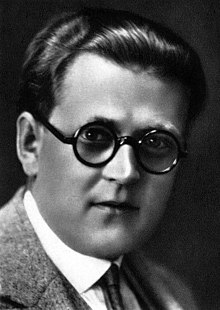Jozef Cíger-Hronský
Jozef Cíger-Hronský , actually Jozef Cíger (born February 23, 1896 in Altsohl , Austria-Hungary , today Slovakia ; † July 13, 1960 in Luján , Argentina ) was a Slovak writer, teacher, editor, publicist and administrator of Matica slovenská .
Life
Jozef Cíger-Hronský was born into a carpenter's family and attended an elementary school in Altsohl (1902–1907), community school in Karpfen (1907–1910) and a Hungarian teacher training institution in Levice (1910–1914). In the years 1914-1933 he was a teacher in different places ( Horné Mladonice , Senohrad , Krupina, Kremnica and Martin when he at) except for the years 1917-18 Italy Front of the First World War had to serve.
In addition to his first occupation, he was also the editor of the children's magazine Slniečko (Little Sun) from 1928 to 1945 . In 1933 he became the secretary of Matica slovenská and finally in 1940 the administrator of the same organization. He was also responsible for founding the Neografia printing company in Martin.
Since he came under the influence of the Slovak People's Party , in 1945, after the dissolution of the Slovak state , he fled to the American zone of occupation in Austria , then to Rome in Italy, and finally to Argentina , where he worked as a draftsman and designer for a textile factory in Luján . There, before his death, he founded the foreign Matica slovenská ( zahraničná Matica slovenská ) and was chairman of the Slovak National Council abroad and honorary chairman of the Association of Slovak Writers and Artists Abroad.
Because of his orientation towards the Slovak People's Party and the negative attitude towards the Slovak National Uprising , his works were banned in communist Czechoslovakia. Only after the Velvet Revolution in 1989 was he fully rehabilitated and in 1993 his body was brought back to Slovakia and buried again at the Martin National Cemetery.
Works
The work of Jozef Cíger-Hronský can be classified as Expressionism . In his works he deals with subjects such as life in the country, etc.
prose
|
|
The Podpolianske rozprávky work has also been translated into German.
Dramas
- 1926 - Moor company
- 1929 - Červený trojuholník (The red triangle)
- 1929 - Návrat (return)
Youth literature
|
|
literature
- I. Kružliak: Hronský, Jozef , in: Biographical Lexicon on the History of Southeast Europe . Vol. 2. Munich 1976, pp. 190 f.
Web links
- Jozef Cíger-Hronský on osobnosti.sk (Slovak)
- Entry about Jozef Cíger-Hronský on Literárne informačné centrum ( German )
| personal data | |
|---|---|
| SURNAME | Cíger-Hronský, Jozef |
| ALTERNATIVE NAMES | Cíger, Jozef (real name) |
| BRIEF DESCRIPTION | Slovak writer |
| DATE OF BIRTH | February 23, 1896 |
| PLACE OF BIRTH | Old sole |
| DATE OF DEATH | July 13, 1960 |
| Place of death | Lujan |

